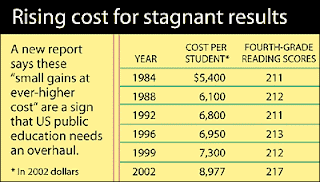Add this to the information released late on Friday in order to have it cold by the time folks are paying attention Monday morning.
Metro schools' teachers union rejected a $400,000 donation that would have bolstered teachers' pay based on the performance of their students.
This is all about protecting their membership numbers and their power and certainly NOT about rewarding excellent teachers for excellent work. This is about preventing 'dissension' in the ranks according to the union reps at the negotiating table back in August.
School board officials said questions to union representatives about the number of members and how information about the program was disseminated to union members went unanswered Friday.
And I'm willing to bet that they'll remain unanswered. This union is NOT about to stand in the light of day and be accountable for their actions. This was a close vote of 51.3% to 48.7%. Can we demand a recount?
Calls to union representatives Eric Huth and Jamye Merritt were not returned before press time.
No suprise there.
Mr. Huth is often awol.
So let's review. The union complains that teachers aren't paid enough. A private donor comes forward and offers to pay them more--based on performance. This is clearly a pilot program that is laying the groundwork that may eventually allow everyone to participate. The general union membership rejects the offer because, based on previous statements, they don't want the rest of the members to be left out. Making union members happy is the mission--not ensuring that excellent teachers get excellent wages.
This all certainly flys in the face of the teacher union's
published mission statement:
Our mission is to promote excellence in the Metro School system, seek community support for public education, secure economic and professional security for educators, maintain a strong united teaching organization, advance human and civil rights in education, and empower teachers!
- How does this rejection of incentive pay promote excellence in our schools?
- How does rejecting $400,000 of 'community support' encourage additional community support?
- How does rejecting this pay increase secure economic security for these staff members?
- How does it advance human and civil rights for these staff members?
I'm betting they've shot themselves in the foot and it will certainly not even help maintain a 'strong united teaching organization'. Maybe they feel empowered--but I think they paid too high a price for what will quickly become a bad investment.
Here's part of the
MENA official statement.
Dr. Jamye Merritt, president of MNEA, said, “There were several things in the Memorandum that I and other leaders were not thrilled with; however, we felt it was solid enough to be put to our members for their decision. And they have spoken.”
MNEA Vice President and Negotiations Chair Erick Huth, a teacher at Middle College High School at Nashville State Community College, commented, “Even though the MOU included several of the criteria that TEA (Tennessee Education Association) recommends for alternative pay plans, teachers were apparently skeptical about this particular plan.”
Delores Jones, a teacher at Tusculum Elementary School said, “I voted no for three reasons: 1) the bonuses themselves were too small, especially the ones for the teachers; 2) I’m against paying teachers based just on test scores, and 3) I’m concerned about how this plan would handle the impact of English Language Learners on the test scores.”
Both MNEA and the school board’s team agreed that the bonuses finally included were too small. The board attempted to convince the donor of the $400,000 available for this plan to increase the amount; however, he declined.
Merritt added, “I’m sure that we’ll continue to talk about diversified pay plans. But this particular plan was not acceptable to our members.”
Bonuses were "too small" isn't something better than nothing? It's a pilot program folks. Did anyone expect that we'd get it 100% the first time out? I didn't. I expected that based on this trial we would know for sure what needed to be tweaked. I'm sure we'll continue to talk about diversified plans--but remember talk doesn't spend at Kroger or pay the mortgage.
And note the arrogance of asking the donor to kick in more money. How does abusing our donors in this way encourage others to step up?
It's going to take an exodus of members (and not that many more I'm told) to decertify this union before we will actually get a professional organization that is more concerned about ensuring
quality members over quanity. I encourage teachers to check out a legitimate alternative
Professional Educators of Tennessee.

